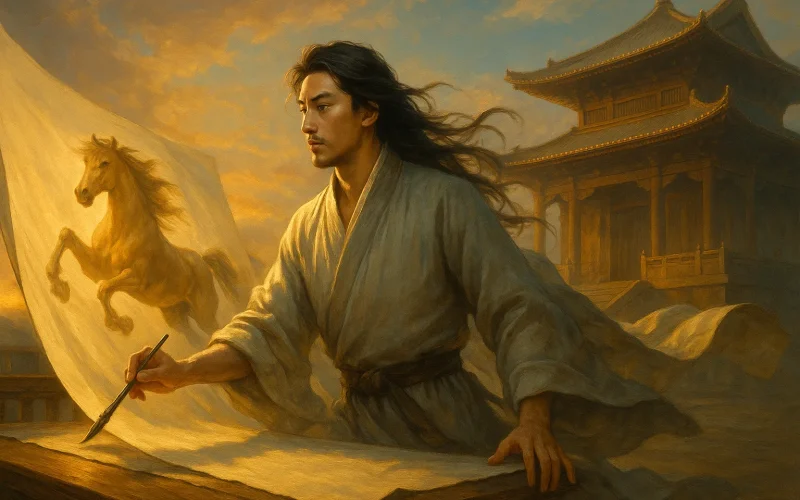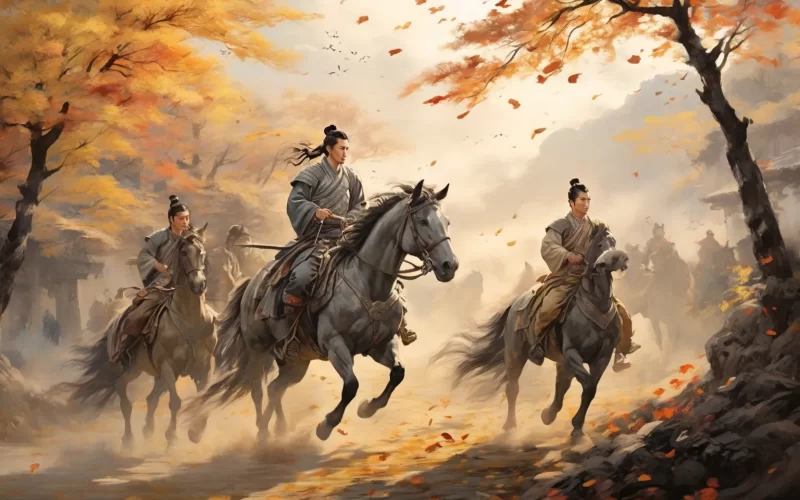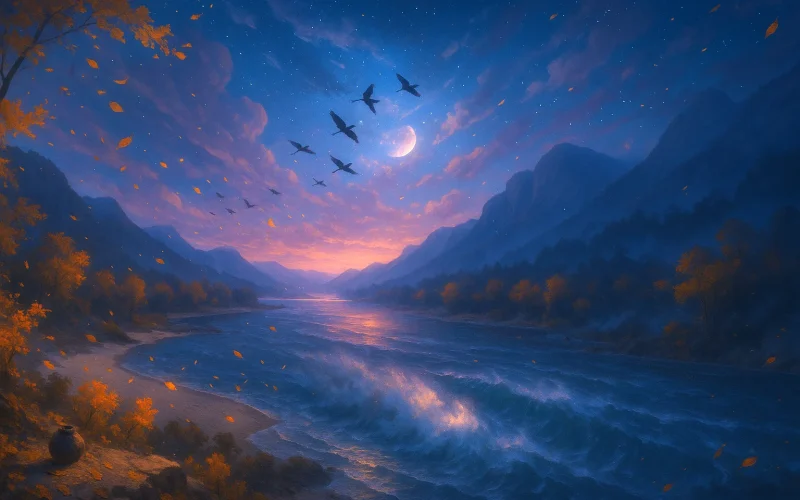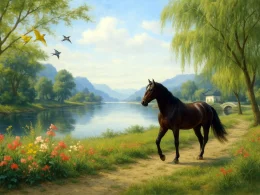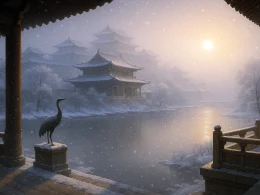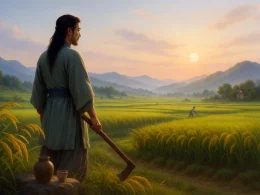O General, descended from Wei's Emperor Wu,
You are nobler now than when a noble...
Conquerors and their velour perish,
But masters of beauty live forever.
...With your brush-work learned from Lady Wei
And second only to Wang Xizhi's,
Faithful to your art, you know no age,
Letting wealth and fame drift by like clouds.
...In the years of Kaiyuan you were much with the Emperor,
Accompanied him often to the Court of the South Wind.
When the spirit left great statesmen, on walls of the Hall of Fame
The point of your brush preserved their living faces.
You crowned all the premiers with coronets of office;
You fitted all commanders with arrows at their girdles;
You made the founders of this dynasty, with every hair alive,
Seem to be just back from the fierceness of a battle.
...The late Emperor had a horse, known as Jade Flower,
Whom artists had copied in various poses.
They led him one day to the red marble stairs
With his eyes toward the palace in the deepening air.
Then, General, commanded to proceed with your work,
You centred all your being on a piece of silk.
And later, when your dragon-horse, born of the sky,
Had banished earthly horses for ten thousand generations,
There was one Jade Flower standing on the dais
And another by the steps, and they marvelled at each other...
The Emperor rewarded you with smiles and with gifts,
While officers and men of the stud hung about and stared.
...Han Gan, your follower, has likewise grown proficient
At representing horses in all their attitudes;
But picturing the flesh, he fails to draw the bone-
So that even the finest are deprived of their spirit.
You, beyond the mere skill, used your art divinely-
And expressed, not only horses, but the life of a good man...
Yet here you are, wandering in a world of disorder
And sketching from time to time some petty passerby
People note your case with the whites of their eyes.
There's nobody purer, there's nobody poorer.
...Read in the records, from earliest times,
How hard it is to be a great artist.
Original Poem
「丹青引赠曹将军霸」
杜甫
将军魏武之子孙, 于今为庶为青门;
英雄割据虽已矣! 文采风流今尚存。
学书初学卫夫人, 但恨无过王右军。
丹青不知老将至, 富贵于我如浮云。
开元之中常引见, 承恩数上南熏殿,
凌烟功臣少颜色, 将军下笔开生面。
良相头上进贤冠, 猛将腰间大羽箭。
褒公鄂公毛发动, 英姿飒爽犹酣战。
先帝天马玉花骢, 画工如山貌不同。
是日牵来赤墀下, 迥立阊阖生长风。
诏谓将军拂绢素, 意匠惨淡经营中;
斯须九重真龙出, 一洗万古凡马空。
玉花却在御榻上, 榻上庭前屹相向;
至尊含笑催赐金, 圉人太仆皆惆怅,
弟子韩干早入室, 亦能画马穷殊相;
干惟画肉不画骨, 忍使骅骝气凋丧。
将军画善盖有神, 偶逢佳士亦写真;
即今漂泊干戈际, 屡貌寻常行路人。
涂穷反遭俗眼白, 世上未有如公贫;
但看古来盛名下, 终日坎壈缠其身。
Interpretation
In the second year of the Guangde era of Emperor Daizong of the Tang Dynasty (764), Du Fu met the renowned painter Cao Ba, who had been demoted to commoner status, in Chengdu. He wrote this poem as a farewell gift. Through his depiction of Cao Ba's study and practice of painting, Du Fu portrays the tumultuous life of Cao Ba, marked by both glory and decline. The term "丹青" (dān qīng) in the title refers to painting, while "引" (yǐn) is the name of a musical tune, symbolizing Cao Ba's artistic life as a fluctuating melody, filled with both brilliance and sorrow.
First Couplet: "将军魏武之子孙,于今为庶为青门。"
Jiāng jūn nǐ shì Wèi Wǔ Dì Cáo Cāo de hòu dài, rú jīn què lún wéi shù rén, zhù zài qīng mén wài.
General, you are a descendant of Emperor Wu of Wei, Cao Cao, but now you have been reduced to a commoner, living outside the Blue Gate.
The poet first highlights Cao Ba's noble lineage. Despite his illustrious ancestry, he has been demoted and now lives in the Qingmen (a poor district). This stark contrast sets the tone for the poem's lament on the impermanence of worldly fortunes.
Second Couplet: "英雄割据虽已矣!文采风流今尚存。"
Xī rì yīng xióng de gē jù bà yè suī yǐ bù zài, dàn Cáo shì yī zú de wén cǎi fēng liú zhì jīn yóu cún.
Although the heroic feats of territorial dominance are no more, the literary grace and elegance of the Cao family still endure.
Du Fu praises Cao Ba for inheriting the cultural talents of his ancestors, even if he lacks their military achievements.
Third Couplet: "学书初学卫夫人,但恨无过王右军。"
Dāng chū nǐ xué shū fǎ shí, xiào fǎng Wèi Fū rén bǐ fǎ, zhǐ hèn zì jǐ wú fǎ chāo yuè Wáng Xī zhī.
When you first studied calligraphy, you emulated the style of Lady Wei, but lamented that you could not surpass Wang Xizhi.
Here, the mention of "studying calligraphy" serves to contrast Cao Ba's dedication and achievements in painting.
Fourth Couplet: "丹青不知老将至,富贵于我如浮云。"
Chén jìn yú huì huà zhī zhōng, bù jué nián huá lǎo qù; gōng míng fù guì yú wǒ bù guò shì fú yún bà le.
Immersed in painting, you do not notice the approach of old age; fame and wealth are but fleeting clouds to me.
This line reveals Cao Ba's noble character and his indifferent attitude towards fame and fortune.
Fifth Couplet: "开元之中常引见,承恩数上南薰殿。"
Kāi yuán nián jiān, nǐ cháng bèi zhào jiàn, lǚ cì dēng shàng Nán Xūn Diàn shòu dào huáng ēn.
During the Kaiyuan era, you were often summoned to the imperial court and repeatedly honored in the Nanxun Hall.
This couplet recounts Cao Ba's past glory and his frequent audiences with the emperor.
Sixth Couplet: "凌烟功臣少颜色,将军下笔开生面。"
Líng yān gé zhōng de gōng chén huà xiàng yǐ jīng tuì sè, wéi yǒu jiāng jūn chóng xīn zuò huà, fù yǔ rén wù xiān huó shēng dòng de miàn róng.
The portraits of the meritorious officials in the Lingyan Pavilion have faded, but you, General, have breathed new life into them with your brush.
Cao Ba's skill in painting the portraits of meritorious officials is highlighted here.
Seventh Couplet: "良相头上进贤冠,猛将腰间大羽箭。"
Wén chén tóu dài jìn xián guān, wǔ jiàng yāo pèi dà yǔ jiàn.
The civil officials wear the Jinxian hats, and the military generals carry large feathered arrows at their waists.
Cao Ba's meticulous brushwork vividly captures the images of these officials.
Eighth Couplet: "褒公鄂公毛发动,英姿飒爽犹酣战。"
Bāo gōng Duàn Zhì xuán, È gōng Yù chí Jìng dé fǎng fú máo fā fēi yáng, yīng zī sà shuǎng, zhèng hān zhàn bù zhǐ.
Duke Bao and Duke E seem to have their hair flying, their heroic spirits still engaged in fierce battle.
Cao Ba's portraits not only capture the likeness but also the spirit of the subjects.
Ninth Couplet: "先帝天马玉花骢,画工如山貌不同。"
Táng Xuán zōng de tiān mǎ Yù huā cōng, zhòng duō huà gōng dōu nán yǐ huà dé bī zhēn.
The heavenly horse Yuhuacong of Emperor Xuanzong, which many painters struggled to depict accurately.
This couplet introduces Cao Ba's famous painting, "The Portrait of Yuhuacong."
Tenth Couplet: "是日牵来赤墀下,迥立阊阖生长风。"
Zhè tiān Yù huā cōng bèi qiān dào gōng mén chì sè tái jiē xià, tǐng lì bù dòng, zōng máo piāo yì rú shēng fēng yī bān.
On this day, Yuhuacong was led to the red steps of the palace gate, standing still with its mane flowing as if in the wind.
This line sets the stage for Cao Ba's painting, capturing the majestic presence of the horse.
Eleventh Couplet: "诏谓将军拂绢素,意匠惨淡经营中。"
Huáng dì xià zhào mìng nǐ zài bái juàn shàng zuò huà, zuò huà shí nǐ jīng xīn gòu sī, kǔ xīn jīng yíng.
The emperor ordered you to paint on the white silk, and you meticulously planned and executed the painting.
"惨淡经营" (cǎn dàn jīng yíng) conveys Cao Ba's painstaking effort and artistic ingenuity.
Twelfth Couplet: "斯须九重真龙出,一洗万古凡马空。"
Bù yī huì er, yī pǐ rú lóng bān wēi wǔ de jùn mǎ yuè rán zhǐ shàng, lìng lì dài suǒ yǒu huà mǎ zhī zuò xiāng xíng jiàn chù.
In a short while, a majestic horse, like a dragon, emerges on the paper, overshadowing all previous horse paintings.
This couplet uses contrast to highlight Cao Ba's unparalleled skill in painting horses.
Thirteenth Couplet: "玉花却在御榻上,榻上庭前屹相向。"
Huà zhōng de Yù huā cōng fàng zài yù tà shàng, yǔ tíng qián de zhēn mǎ duì shì, jìng zhēn jiǎ nán biàn.
The painted Yuhuacong is placed on the imperial couch, facing the real horse in the courtyard, indistinguishable from reality.
This scene demonstrates the astonishing realism of Cao Ba's painting.
Fourteenth Couplet: "至尊含笑催赐金,圉人太仆皆惆怅。"
Huáng dì hán xiào cuī cù cì jīn, yǔ rén tài pú jiē chóu chàng.
The emperor smiles and urges the bestowal of gold, while the grooms and stable officials are filled with melancholy.
The melancholy of the stable officials contrasts with Cao Ba's extraordinary skill.
Fifteenth Couplet: "弟子韩干早入室,亦能画马穷殊相。"
Dì zǐ Hán Gàn zǎo rù shì, yì néng huà mǎ qióng shū xiàng.
Your disciple Han Gan, who entered your studio early, is also skilled in painting horses with distinct features.
Du Fu introduces Han Gan as a successor to Cao Ba's legacy.
Sixteenth Couplet: "干惟画肉不画骨,忍使骅骝气凋丧。"
Dàn Hán Gàn zhǐ huì huà mǎ de wài xíng, bù huì biǎo xiàn qí nèi zài jīng shén, yǐ zhì jùn mǎ de shén yùn xiāo shī.
But Han Gan only captures the external form of the horse, failing to convey its inner spirit, thus losing the horse's vitality.
This line further emphasizes the unique "spiritual" quality of Cao Ba's horse paintings.
Seventeenth Couplet: "将军画善盖有神,偶逢佳士亦写真。"
Jiāng jūn de huà jì yǒu rú shén zhù, ǒu yù qí rén yì wèi qí huà xiàng.
Your painting skill is almost divine, and you occasionally paint portraits of extraordinary individuals.
Du Fu further praises Cao Ba's exceptional talent.
Eighteenth Couplet: "即今漂泊干戈际,屡貌寻常行路人。"
Rú jīn nǐ liú luò yú zhàn luàn zhī zhōng, cháng cháng wèi lù rén huà xiàng yǐ móu shēng.
Now you wander amidst the chaos of war, often painting portraits of ordinary passersby to make a living.
Here, the poem turns to Cao Ba's current state of hardship and poverty.
Nineteenth Couplet: "涂穷反遭俗眼白,世上未有如公贫。"
Liú luò wú yī, fǎn bèi sú shì zhī rén qīng shì, zhè shì jiān kǒng pà méi yǒu bǐ nǐ gèng pín kùn de rén le.
Destitute and without support, you are despised by the vulgar world; there is probably no one poorer than you.
"未有如公贫" (wèi yǒu rú gōng pín) pushes the emotional intensity to its peak.
Twentieth Couplet: "但看古来盛名下,终日坎壈缠其身。"
Zì gǔ yǐ lái, shèng míng zhī xià de rén duō shì qióng kùn liáo dǎo, mìng yùn kǎn kě.
Since ancient times, those with great reputations often end up in poverty and hardship.
This couplet laments Cao Ba's current plight and reflects Du Fu's own experiences of hardship.
Overall Appreciation
This poem, through its depiction of Cao Ba's family background, painting skills, past glory, and current hardships, creates a stark contrast that reflects the impermanence of worldly fortunes and the tragic decline of a hero. Cao Ba is not only a master painter but also a reflection of Du Fu's own fate. Through Cao Ba's experiences, Du Fu expresses his indignation at the fickleness of the world and the frustration of talented individuals.
Writing Characteristics
- Contrast: The poem employs contrasts between Cao Ba's past glory and current poverty, between Cao Ba and Han Gan, and between painted and real horses, making the narrative vivid and striking.
- Detailed Descriptions: Phrases like "惨淡经营" (cǎn dàn jīng yíng) and "一洗万古凡马空" (yī xǐ wàn gǔ fán mǎ kōng) provide detailed depictions of Cao Ba's focus and the lifelike quality of his paintings.
- Deep Emotion: The poem contains both admiration for Cao Ba's skill and deep sympathy for his impoverished later years.
Insights
This poem not only celebrates Cao Ba's artistic talent but also reveals the tragedy of talented individuals being overlooked in feudal society. Du Fu, using Cao Ba as a mirror, expresses his own frustrations and unfulfilled ambitions. Cao Ba's lifelong dedication to art and his indifference to fame and fortune serve as an inspiration for future generations in their pursuit of artistic truth.
Poem translator:
Kiang Kanghu
About the poet
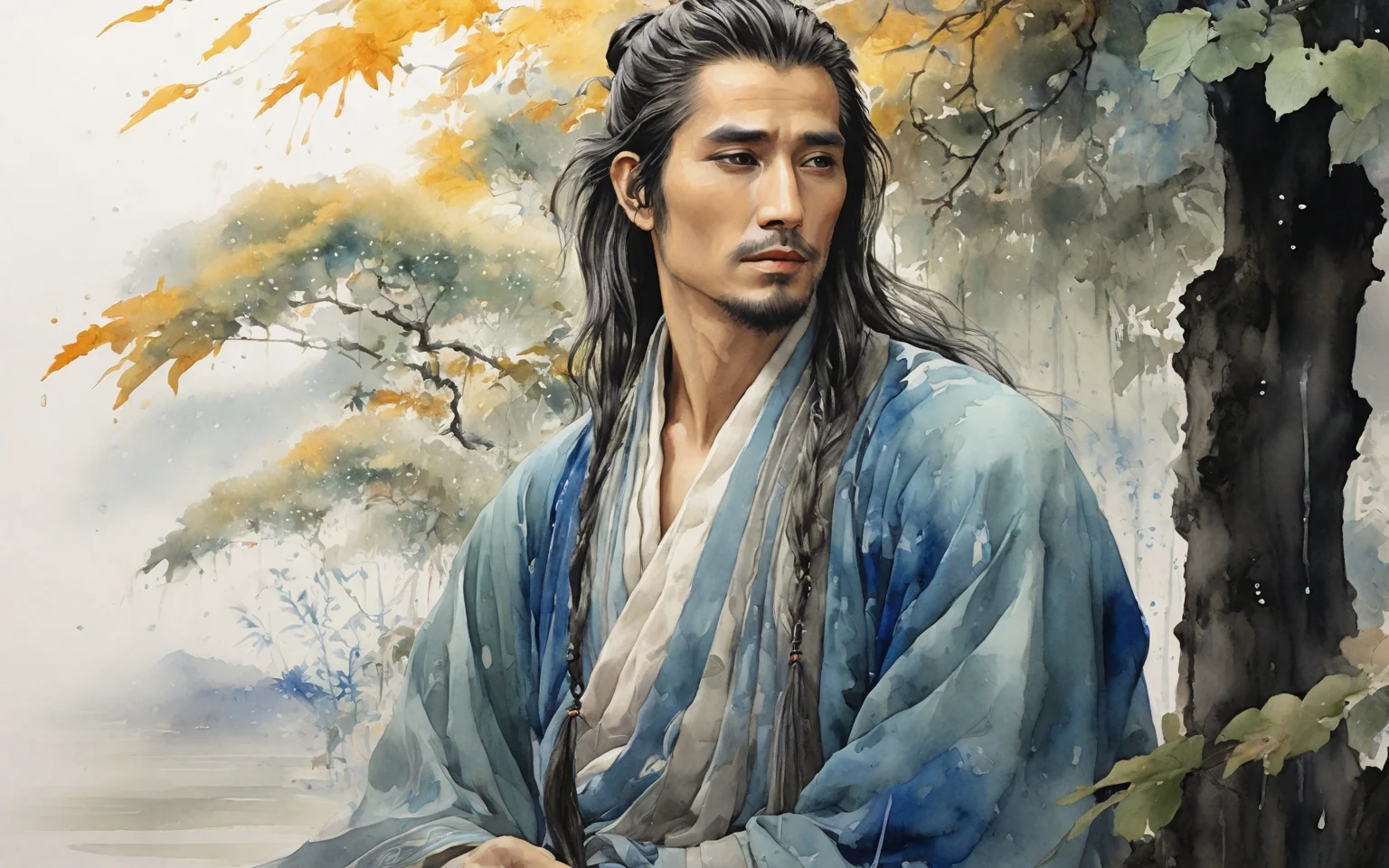
Du Fu (杜甫), 712 - 770 AD, was a great poet of the Tang Dynasty, known as the "Sage of Poetry". Born into a declining bureaucratic family, Du Fu had a rough life, and his turbulent and dislocated life made him keenly aware of the plight of the masses. Therefore, his poems were always closely related to the current affairs, reflecting the social life of that era in a more comprehensive way, with profound thoughts and a broad realm. In his poetic art, he was able to combine many styles, forming a unique style of "profound and thick", and becoming a great realist poet in the history of China.






